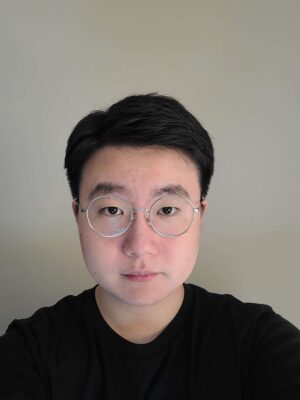 Leo Baik is an undergraduate student with a BSc specializing in Psychology and finishing a degree in Secondary Education. He is currently a member of the Re:Cognition lab at the University of Alberta led by Dr. Ben Dyson. Games have been an important part of his life since his early childhood that has led to various unique experiences. He is interested in the application of various games in research and education as he believes that games have a lot of potential value in such fields that have not been fully unlocked or utilized. In particular, he believes that games that were designed for the purpose of being fun can be utilized and/or repurposed in the classroom and in the lab while being fun, engaging and intrinsically motivating for everyone involved.
Leo Baik is an undergraduate student with a BSc specializing in Psychology and finishing a degree in Secondary Education. He is currently a member of the Re:Cognition lab at the University of Alberta led by Dr. Ben Dyson. Games have been an important part of his life since his early childhood that has led to various unique experiences. He is interested in the application of various games in research and education as he believes that games have a lot of potential value in such fields that have not been fully unlocked or utilized. In particular, he believes that games that were designed for the purpose of being fun can be utilized and/or repurposed in the classroom and in the lab while being fun, engaging and intrinsically motivating for everyone involved.
 Neal Baker, MA is a business librarian at Purdue University. His publications include scholarly anthology book chapters on tabletop RPG product lines, the LEGO Middle-earth product portfolio, and Star Trek: Voyager, as well as peer-reviewed articles on genre topics like Canadian science fiction, the Marvel Comics Alpha Flight series, and anime.
Neal Baker, MA is a business librarian at Purdue University. His publications include scholarly anthology book chapters on tabletop RPG product lines, the LEGO Middle-earth product portfolio, and Star Trek: Voyager, as well as peer-reviewed articles on genre topics like Canadian science fiction, the Marvel Comics Alpha Flight series, and anime.
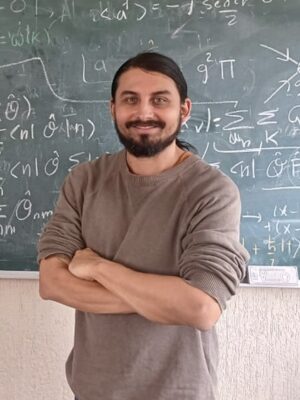 Miguel A. Bastarrachea-Magnani, PhD is Associate Professor in the Physics Department at the Metropolitan Autonomous University-Iztapalapa (UAM-I) in Mexico City. He holds a Ph.D. in Physics and a Ph.D. in Philosophy from the National Autonomous University of Mexico (UNAM). He has been a postdoctoral fellow in Mexico, Germany, and Denmark. His interests lie in several fields, such as Quantum Physics, German Idealism, Philosophy of Myth, and RPG studies. He is the current Role-Playing Studies Researcher Network (RIJR) president based in Mexico City. Also, he is the author of the Mexican TTRPG The Maze, nominated for the Ennie Awards in 2021.
Miguel A. Bastarrachea-Magnani, PhD is Associate Professor in the Physics Department at the Metropolitan Autonomous University-Iztapalapa (UAM-I) in Mexico City. He holds a Ph.D. in Physics and a Ph.D. in Philosophy from the National Autonomous University of Mexico (UNAM). He has been a postdoctoral fellow in Mexico, Germany, and Denmark. His interests lie in several fields, such as Quantum Physics, German Idealism, Philosophy of Myth, and RPG studies. He is the current Role-Playing Studies Researcher Network (RIJR) president based in Mexico City. Also, he is the author of the Mexican TTRPG The Maze, nominated for the Ennie Awards in 2021.
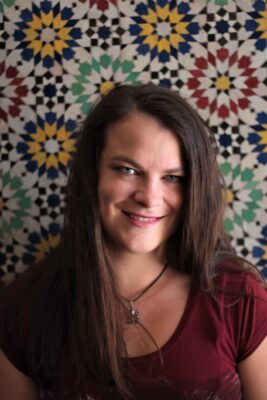 Sabina Belc, MS is a biotechnologist by her formal education, but since 2008 she has been working as a youth worker, facilitator and experiential educator. Her main passions are educational games (especially escape rooms) as a tool for improving civic literacy, game design-based learning, media literacy, youth dialogue processes and, in recent years, digital youth work.
Sabina Belc, MS is a biotechnologist by her formal education, but since 2008 she has been working as a youth worker, facilitator and experiential educator. Her main passions are educational games (especially escape rooms) as a tool for improving civic literacy, game design-based learning, media literacy, youth dialogue processes and, in recent years, digital youth work.
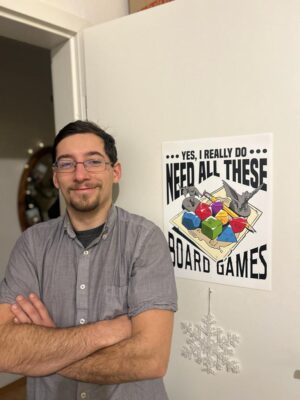 Pawel Bornstedt, MA was born in Bielsko-Biala in Poland and holds a Masters of Education (2022) from Albert-Ludwigs-Universität in Freiburg im Breisgau, Germany. He teaches German and History at Rhein Gymnasium in Sinzig, Germany.
Pawel Bornstedt, MA was born in Bielsko-Biala in Poland and holds a Masters of Education (2022) from Albert-Ludwigs-Universität in Freiburg im Breisgau, Germany. He teaches German and History at Rhein Gymnasium in Sinzig, Germany.
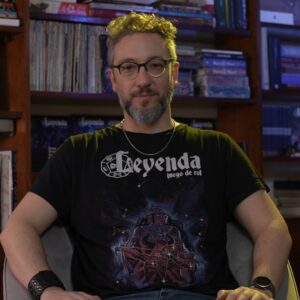 Marcos O. Cabobianco is a doctoral student in History at the University of Buenos Aires (UBA). He currently works as a teacher of Ancient History I (East) as Head of Practical Work. His articles have appeared in several specialized journals, and his own publishing house published his book Leyenda (an original form of Tabletop Role-Playing Game), Mito Editorial, in 2022.
Marcos O. Cabobianco is a doctoral student in History at the University of Buenos Aires (UBA). He currently works as a teacher of Ancient History I (East) as Head of Practical Work. His articles have appeared in several specialized journals, and his own publishing house published his book Leyenda (an original form of Tabletop Role-Playing Game), Mito Editorial, in 2022.
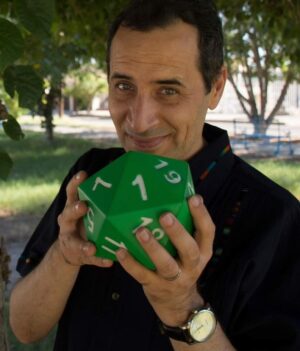 Ricardo Morales Carbajal, PhD has been an instructor at the Autonomous University of Baja California since 2011. He has applied role-playing games as a pedagogical tool since 2013. He holds a PhD in Biomedical Engineering and has a background in Electronics Engineering and Neuro-engineering with a main research interest inoptogenetics principles in cattle. Since 2017, he has been a researcher in the CONAHCYT program.
Ricardo Morales Carbajal, PhD has been an instructor at the Autonomous University of Baja California since 2011. He has applied role-playing games as a pedagogical tool since 2013. He holds a PhD in Biomedical Engineering and has a background in Electronics Engineering and Neuro-engineering with a main research interest inoptogenetics principles in cattle. Since 2017, he has been a researcher in the CONAHCYT program.
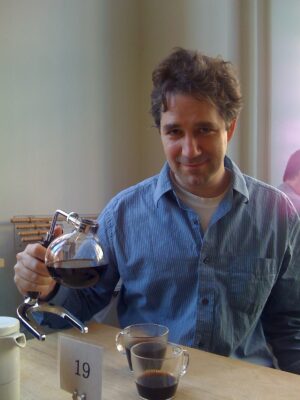 Joseph Dumit, PhD is an anthropologist of passions, performance, brains, computers, AI, games, bodies, drugs and
Joseph Dumit, PhD is an anthropologist of passions, performance, brains, computers, AI, games, bodies, drugs and
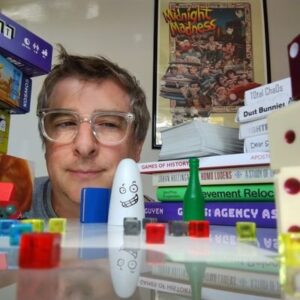 Ben Dyson, PhD (he/him) is an Associate Professor in the Department of Psychology at the University of Alberta, Canada, and director of the Re:Cognition Lab. Ben’s work examines the intersections between empirical science and analog games, including the use of game spaces in revealing the dynamics of competitive decision-making, and the hidden scientific principles found within commercially available board and card games. The lab also develops entirely novel games that further help our understanding of human cognition. To this end, the lab is currently prototyping the computational card game Total Chaos, which explores the mysteries of negative numbers and zero.
Ben Dyson, PhD (he/him) is an Associate Professor in the Department of Psychology at the University of Alberta, Canada, and director of the Re:Cognition Lab. Ben’s work examines the intersections between empirical science and analog games, including the use of game spaces in revealing the dynamics of competitive decision-making, and the hidden scientific principles found within commercially available board and card games. The lab also develops entirely novel games that further help our understanding of human cognition. To this end, the lab is currently prototyping the computational card game Total Chaos, which explores the mysteries of negative numbers and zero.
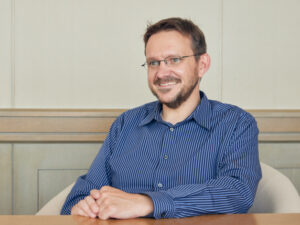 Peter D. Evan, PhD is a professor at Seikei University in Tokyo. He has a BA in Medieval Germanic Literature from Indiana University, an MA in Medieval History from Durham University, and a PhD in Anglo-Saxon, Norse, and Celtic from the University of Cambridge. His research primarily focuses on late Anglo-Saxon monasticism, liturgical commemoration, and codicology, but he is also interested in conceptions and portrayals of the medieval in tabletop roleplaying games, and the history of tabletop roleplaying games and wargaming in Japan.
Peter D. Evan, PhD is a professor at Seikei University in Tokyo. He has a BA in Medieval Germanic Literature from Indiana University, an MA in Medieval History from Durham University, and a PhD in Anglo-Saxon, Norse, and Celtic from the University of Cambridge. His research primarily focuses on late Anglo-Saxon monasticism, liturgical commemoration, and codicology, but he is also interested in conceptions and portrayals of the medieval in tabletop roleplaying games, and the history of tabletop roleplaying games and wargaming in Japan.
 Francisco Fernando Gallego Escobar, MA is a Social Communicator — Journalist, Master in Education; audiovisual producer and research professor with over 20 years of experience. He has experience in leadership roles in education and audiovisual production, as well as in managing educational, communication, and entertainment projects, including photographic and video graphic creation and audiovisual editing processes. He has studied the educational potential of comics and developed various techniques and strategies for narrative creation, adapting classical methodologies to contemporary needs. He has also explored the use of role-playing games in the classroom as tools for playful education and transmedia narratives as a communicative phenomenon. Likewise, he is a full-time professor at Pascual Bravo University Institution in Medellín, teaching audiovisual courses in Graphic Design and leading the OVNI Research Group, which focuses on research + creation projects in narratives and iconic languages.
Francisco Fernando Gallego Escobar, MA is a Social Communicator — Journalist, Master in Education; audiovisual producer and research professor with over 20 years of experience. He has experience in leadership roles in education and audiovisual production, as well as in managing educational, communication, and entertainment projects, including photographic and video graphic creation and audiovisual editing processes. He has studied the educational potential of comics and developed various techniques and strategies for narrative creation, adapting classical methodologies to contemporary needs. He has also explored the use of role-playing games in the classroom as tools for playful education and transmedia narratives as a communicative phenomenon. Likewise, he is a full-time professor at Pascual Bravo University Institution in Medellín, teaching audiovisual courses in Graphic Design and leading the OVNI Research Group, which focuses on research + creation projects in narratives and iconic languages.
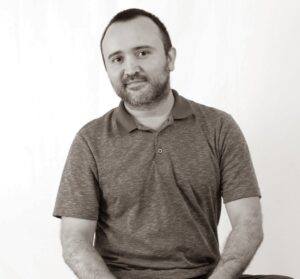 Juan D. Henao-Santa, MBA is a Professor in the Design Department at the Institucion Universitaria Pascual Bravo (IUPB) in Medellín, Colombia. He holds a Master degree in Social Business Management for Social Innovation and Local Development from the Universidad EAFIT. His interest lie in several fields such as Social Design Management, sustainability, Idea prototyping, re-signification of waste and disuse material for social change in a conscious capitalism. He is currently researching, collaborating with professors from other areas of engineering, art and design.
Juan D. Henao-Santa, MBA is a Professor in the Design Department at the Institucion Universitaria Pascual Bravo (IUPB) in Medellín, Colombia. He holds a Master degree in Social Business Management for Social Innovation and Local Development from the Universidad EAFIT. His interest lie in several fields such as Social Design Management, sustainability, Idea prototyping, re-signification of waste and disuse material for social change in a conscious capitalism. He is currently researching, collaborating with professors from other areas of engineering, art and design.
 Meghan Hewitt (she/her) is a Masters student at University College London (UCL) on the Issues in Modern Culture M.A. She received her B.A in English Literature and History from Trinity College Dublin. Her interests involve all things monsters and horror, with a focus on interdisciplinary adaptation. Her book chapter Nuclear Societal Structures in the Fallout Franchise is forthcoming in Atomic Horror: Fears of Nuclear Power in Gothic Literature, Film and Media with Palgrave.
Meghan Hewitt (she/her) is a Masters student at University College London (UCL) on the Issues in Modern Culture M.A. She received her B.A in English Literature and History from Trinity College Dublin. Her interests involve all things monsters and horror, with a focus on interdisciplinary adaptation. Her book chapter Nuclear Societal Structures in the Fallout Franchise is forthcoming in Atomic Horror: Fears of Nuclear Power in Gothic Literature, Film and Media with Palgrave.
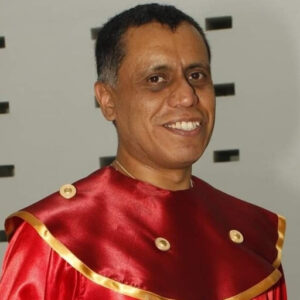 Mauricio Rangel Jiménez holds a Ph.D. in Communication from the Universidad Iberoamericana and is a guest professor in the Department of Research and Knowledge for
Mauricio Rangel Jiménez holds a Ph.D. in Communication from the Universidad Iberoamericana and is a guest professor in the Department of Research and Knowledge for
Design of the Division of Sciences and Arts for Design at the Universidad Autónoma Metropolitana – Unidad Azcapotzalco. Founder and organizer of the International Colloquium of Studies on Role-Playing Games in operation since 2016 and the International Network of Role-Playing Game Researchers since 2018. He currently serves as the operational editor-in-chief of the Journal of Roleplaying Studies and STEAM.
 Sarah Klein is an assistant professor in Communication Arts at the University of Waterloo. Her research centers on how methods travel across time and space. She is interested in play in/as method, including studying the aesthetic, theatrical, and craft modalities of science, and amplifying the empirical capacities of play, art and craft. Her current research takes an ethnographic and ethnomethodological approach to think through and intervene in everyday scientific practice, as well as using ethnomethodology and STS to reconsider and reconfigure practices of reading, performance, and play.
Sarah Klein is an assistant professor in Communication Arts at the University of Waterloo. Her research centers on how methods travel across time and space. She is interested in play in/as method, including studying the aesthetic, theatrical, and craft modalities of science, and amplifying the empirical capacities of play, art and craft. Her current research takes an ethnographic and ethnomethodological approach to think through and intervene in everyday scientific practice, as well as using ethnomethodology and STS to reconsider and reconfigure practices of reading, performance, and play.
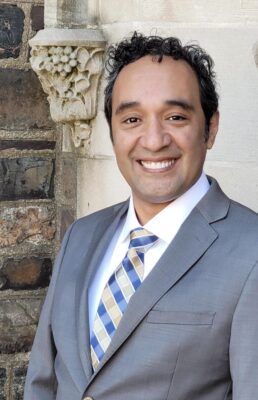 Cristo León, PhD holds a doctorate in Organizational Leadership focusing on Institutional Leadership and Innovation. As an experienced Director of Research, he has successfully managed over 1,500 proposal submissions, securing over 350 new awards and over $77 million in funding. Leon’s passion for role-playing games and storytelling has led him to develop over 30 years of experience as a Dungeon Master, refining his strategic planning, problem-solving, and improvisational skills. He sees clear parallels between developing game worlds and conducting research, believing that his passion for role-playing games has significantly enriched both his personal life and professional achievements.
Cristo León, PhD holds a doctorate in Organizational Leadership focusing on Institutional Leadership and Innovation. As an experienced Director of Research, he has successfully managed over 1,500 proposal submissions, securing over 350 new awards and over $77 million in funding. Leon’s passion for role-playing games and storytelling has led him to develop over 30 years of experience as a Dungeon Master, refining his strategic planning, problem-solving, and improvisational skills. He sees clear parallels between developing game worlds and conducting research, believing that his passion for role-playing games has significantly enriched both his personal life and professional achievements.
 James Lipuma, PhD is an educator who believes in the power of collaboration to create positive change. Legally blind since nine, he promotes broader participation for women and under-represented minorities in STEM. His philosophy of education emphasizes providing students with encouragement, direction, support, and autonomy to achieve their goals. He sees himself as a leader, guiding the learning process through mentoring and coaching. Additionally, he wrote Slayer of Evermore, a fast-paced fantasy adventure that takes readers on a journey through the planet Moniva. His dedication to promoting positive change and creating equal opportunities is an inspiration to all those who work with him.
James Lipuma, PhD is an educator who believes in the power of collaboration to create positive change. Legally blind since nine, he promotes broader participation for women and under-represented minorities in STEM. His philosophy of education emphasizes providing students with encouragement, direction, support, and autonomy to achieve their goals. He sees himself as a leader, guiding the learning process through mentoring and coaching. Additionally, he wrote Slayer of Evermore, a fast-paced fantasy adventure that takes readers on a journey through the planet Moniva. His dedication to promoting positive change and creating equal opportunities is an inspiration to all those who work with him.
 Beatrix (Bea) Livesey-Stephens (she/her) is an MPhil candidate and researcher at Abertay University, where she studies player calibration in analog intimacy TTRPGs and researches European gaming clusters. Her research interests lie at the intersections of linguistics, sex and relationship education, accessibility, and ethics, in which she attempts to map the limits of transformative play and ludic vulnerability.
Beatrix (Bea) Livesey-Stephens (she/her) is an MPhil candidate and researcher at Abertay University, where she studies player calibration in analog intimacy TTRPGs and researches European gaming clusters. Her research interests lie at the intersections of linguistics, sex and relationship education, accessibility, and ethics, in which she attempts to map the limits of transformative play and ludic vulnerability.
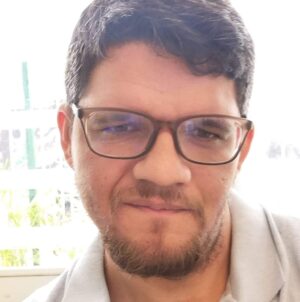 Eduardo Adrian Chavez Lizama, MA is a teacher and researcher at UNID Cozumel. He holds a Master’s degree in education and is also a working archaeologist. He designs pedagogical tools based on modern educational theories such as behaviorism and pedagogical constructivism.
Eduardo Adrian Chavez Lizama, MA is a teacher and researcher at UNID Cozumel. He holds a Master’s degree in education and is also a working archaeologist. He designs pedagogical tools based on modern educational theories such as behaviorism and pedagogical constructivism.
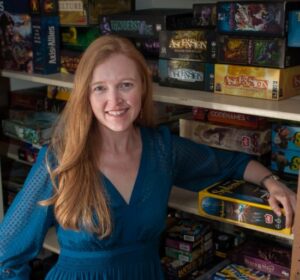 Cathlena Martin, PhD, is Professor of Game Studies and Design at the University of Montevallo. Publication highlights include a co-authored book chapter in The Role-Playing Society on the influence of table-top role-playing games on board and card games, an article in the American Journal of Play on children’s literature’s role in the early history of role-playing games, and two games with critical essays in OneShot: A Journal of Critical Games and Play.
Cathlena Martin, PhD, is Professor of Game Studies and Design at the University of Montevallo. Publication highlights include a co-authored book chapter in The Role-Playing Society on the influence of table-top role-playing games on board and card games, an article in the American Journal of Play on children’s literature’s role in the early history of role-playing games, and two games with critical essays in OneShot: A Journal of Critical Games and Play.
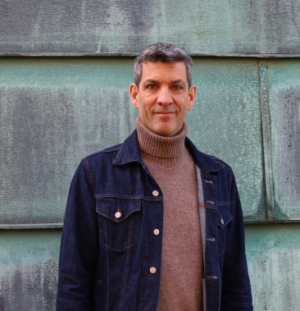 Brian McKenzie, PhD is an Associate Professor at Maynooth University, Ireland, where he serves as the subject leader for its First Year program, Critical Skills and also teaches a graduate micro-credential on RPG writing. He has contributed to several Dungeons & Dragons projects for Goodman Games, and is the author of two forthcoming adventures (also from Goodman Games). His academic research examines game studies, writing, and critical pedagogy.
Brian McKenzie, PhD is an Associate Professor at Maynooth University, Ireland, where he serves as the subject leader for its First Year program, Critical Skills and also teaches a graduate micro-credential on RPG writing. He has contributed to several Dungeons & Dragons projects for Goodman Games, and is the author of two forthcoming adventures (also from Goodman Games). His academic research examines game studies, writing, and critical pedagogy.
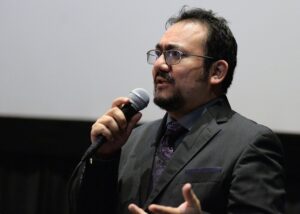 Edgar Meritano holds a Ph.D. in Political Science from UNAM. With a specialty in cinematographic semiotics and audiovisual language, he studied for a master’s degree in the same university cinematographic language with a thing in a horror film. In addition, he holds a degree in Design and Visual Communication from UNAM, specializing in audiovisual production. Meritano was DoP of the Communication and Digital Media program at the ITESM, teaching script and advertising photography. He has been a guest professor for Shanghai University, Coco School in Alicante, Spain, and Vancouver Film School and a speaker in various national and international forums, including the National Cinetheque. He is currently a guest professor for UAM Azcapotzalco.
Edgar Meritano holds a Ph.D. in Political Science from UNAM. With a specialty in cinematographic semiotics and audiovisual language, he studied for a master’s degree in the same university cinematographic language with a thing in a horror film. In addition, he holds a degree in Design and Visual Communication from UNAM, specializing in audiovisual production. Meritano was DoP of the Communication and Digital Media program at the ITESM, teaching script and advertising photography. He has been a guest professor for Shanghai University, Coco School in Alicante, Spain, and Vancouver Film School and a speaker in various national and international forums, including the National Cinetheque. He is currently a guest professor for UAM Azcapotzalco.
 Benton Tyler, PhD, is a Professor of Mathematics at the University of Montevallo in Montevallo, Alabama. He received his Ph.D. in mathematics from the University of Mississippi. His research interests and publications lie primarily in the fields of combinatorics and game theory.
Benton Tyler, PhD, is a Professor of Mathematics at the University of Montevallo in Montevallo, Alabama. He received his Ph.D. in mathematics from the University of Mississippi. His research interests and publications lie primarily in the fields of combinatorics and game theory.
 Gerald Voorhees is associate professor in the Department Communication Arts at the University of Waterloo. He researches games and new media as sites for the construction and contestation of identity and culture and has edited books on masculinities in games, feminism in play, role-playing games, and first-person shooter games. Gerald co-edits Bloomsbury’s Approaches to Game Studies book series and was managing editor of the Gender in Play trilogy in Palgrave’s Games in Context book series.
Gerald Voorhees is associate professor in the Department Communication Arts at the University of Waterloo. He researches games and new media as sites for the construction and contestation of identity and culture and has edited books on masculinities in games, feminism in play, role-playing games, and first-person shooter games. Gerald co-edits Bloomsbury’s Approaches to Game Studies book series and was managing editor of the Gender in Play trilogy in Palgrave’s Games in Context book series.
